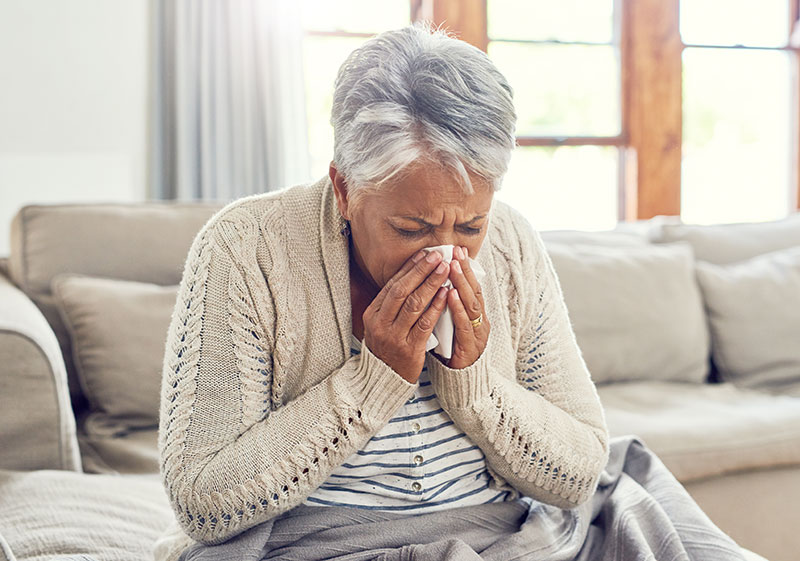Senior Allergy Management: Tips & Treatments for a Comfortable Season
Sneezes, sniffles, pollen-covered cars — allergy season is back with its usual discomforts. This time of year can be especially tough on seniors, whose bodies aren’t as quick to fend off these irritants.
But there are plenty of ways to make this allergy season more manageable for your senior loved ones. From smart preventative strategies to effective treatments, we’ll cover how to keep seasonal allergies under control.
Steering Clear of Allergens With Preventative Measures
Seasonal allergies embody the saying, “An ounce of prevention is worth a pound of cure.” The best way to combat allergic reactions — and all of their unpleasant symptoms — is to keep pollen exposure to a minimum.
Keep Outdoor Allergens Out
Pollen loves to cling to clothes, pets, and pretty much everything else. So anytime you come back indoors, you’re bringing in a variety of hitchhikers. You can reduce the number of irritants that make it inside by having everyone:
- Take off their shoes at the door
- Give pets a quick wipe-down after walks and bathe them regularly
- Bathe, wash their hair, and change clothes after being outside
- Keep doors and windows closed as much as possible
- Dust and vacuum frequently, including mattresses and upholstered furniture
Filter Out Unwanted Irritants
An air purifier can do an amazing job of capturing those tiny pollen particles you can’t see but can definitely feel. Just make sure it uses a HEPA (high-efficiency particulate air) filter, which can remove 99.97% of particles. If you have central air and heating, you can also opt for an HVAC filter with a higher MERV rating and change it regularly.
Keep an Eye on the Weather
Most weather reporting sources include allergen projections so you can see when pollen is at its peak and plan outdoor activities around lower pollen times. As a general rule of thumb, pollen counts are higher on dry, windy days and lower after it rains.
Treatment Options for Allergy Relief
Of course, even if you follow all the tips above, some irritants will inevitably find their way in. Fortunately, there are plenty of treatment options available to limit reactions, including:
Over-the-Counter (OTC) Medications
OTC antihistamines and nasal sprays can offer quick relief, and most of them are safe to use regularly throughout the allergy season. It might take some trial and error, but you should be able to find a medication that alleviates most allergy symptoms.
However, it’s especially important for seniors to talk to their doctors before starting any new medication, even an OTC one, to make sure it won’t affect any other health issues or interfere with a current medication.
Prescription Treatments
For tougher allergy cases, a doctor may recommend stronger prescription meds or allergy shots. This typically involves undergoing allergy testing to pinpoint specific irritants so the doctor can identify the most effective treatment option.
Even if prescription medications aren’t necessary, allergy testing can still be helpful in avoiding or limiting exposure to specific allergens.
Natural Supplements
There are also natural options that can help with minor allergies, or you can use them in combination with medication for more severe allergies. Saline nasal rinses and neti pots (using distilled water only!), local honey, and some herbal supplements have been shown to prevent or reduce reactions.
But keep in mind that just because these treatments are natural doesn’t mean they’re appropriate or healthy for everyone. Seniors should always talk to their doctors before starting any new treatment.
A Helping Hand During Allergy Season
Reducing exposure to allergens and managing symptoms can significantly increase seniors’ quality of life during allergy season. With these simple precautions and treatments, your senior loved ones can enjoy the beauty of spring with fewer sneezes and sniffles.
If you or your loved one need a little extra assistance, Right Hand Care is here. Our experienced, compassionate in-home caregivers can help with personal hygiene, housekeeping, medication compliance, and more — for a sneeze-free allergy season.
For more information on our services or to set up a care plan, contact us today.

We are Superheroes in Comfortable Clothes™
We take care of our clients, their families, our staff, and our league of franchise owners.

